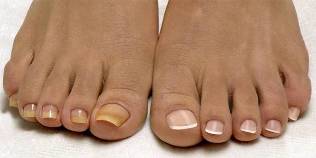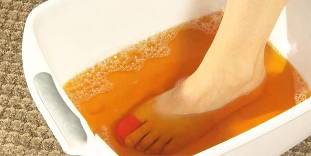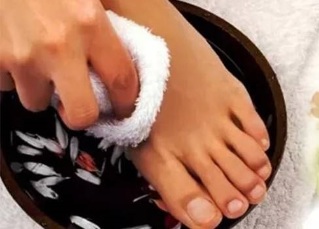There are many non-standard tools for the treatment of fungal infections: iodine solution, garlic, Apple cider vinegar. Similar action has and hydrogen peroxide for fungus toenails: according to reviews, this tool is able to cure even advanced cases of the disease. Fans of this method argue that you can kill the fungus and only those antiseptic. Supporters of traditional medicine prefer narrow means, with antifungal activity.

What is fungus of the toenails
The medical name of the disease – onychomycosis. It is called fungi-dermatophytes of the genus Trichophyton, Epidermophyton and less frequently the agents of microsporia (ringworm). Fungal infection of the nail plate – not a cosmetic defect, is a serious disease that has its own code according to the international classification of diseases ICD-10. Onychomycosis can capture some parts of the nail plate or the entire nail (then, doctors call it total). Currently accepted classification according to the appearance of the nail (in the web you can find pictures):
- normotroficheskie – stripes, spots while maintaining a conventional shape and thickness of the nail;
- hypertrophic – plate grows outwards, change colour, lose gloss, thickens, begins to crumble;
- fungal – affected part dies and is rejected from the bed.
Onychomycosis just to get infected, so it is very common: according to research, the disease occurs in approximately 27% of the population of Europe. Routes of transmission – public locker rooms, saunas, swimming pools. The older a person is, the higher the probability of infection. At risk are patients with psoriasis and diabetes mellitus, these infection "clings" is much more likely.
Treatment of nail fungus with hydrogen peroxide
Fungal infection should be distinguished from non-fungal infections of the nail plate. Be able to do this dermatologist with the help of analysis, which takes place in hospitals and private laboratories. Based on this, you can pick the right drug from a variety of funds designed to cure fungus, both pharmacy and national. Special attention deserves the treatment of fungus toenails with hydrogen peroxide.
The normal antiseptic, which is everybody can surprise the breadth of the spectrum. In addition to the treatment of wounds, it can be used for disinfection of surfaces in house, teeth whitening, solution, ear plugs. Treatment of fungus on toe nails with hydrogen peroxide, perhaps due to its property of softening and separating from the healthy tissues nekrotizirovannye areas.
The way with vinegar
For fungi destructive acidic environment, so in many folk recipes running lose treated with a solution of vinegar. There are several ways to use vinegar and peroxide for fungus toenails:
- A compress of diluted in equal proportions of three percent peroxide and vinegar. A mixture with a characteristic smell liberally soaked cotton swab, which should be applied to the affected nail. Keep the compress until the end of the hiss. Repeat each morning and evening during the month.
- A paste of vinegar and baking soda. You need to take two tablespoons of baking soda and water and one of vinegar and peroxide. The resulting paste should be applied on the affected nails in a day for 2 times, to withstand 15-20 minutes, then rinse.
- Foot bath in vinegar water with addition of hydrogen peroxide. The concentration of peroxide and vinegar per litre of warm water with two tablespoons. Such baths for 15 minutes twice a week will be the prevention of recurrence.

Treatment of nail fungus with hydrogen peroxide according to Neumyvakina
Ivan Pavlovich – doctor, author of several non-traditional methods of healing the body, including with the help of hydrogen peroxide. This antiseptic, the Professor believes, is able to kill pathogens in the intestinal flora and to treat serious systemic disease in humans. Apply the peroxide on his method, it is recommended both internally and externally.
For the treatment of fungus toenails with hydrogen peroxide, the author proposes to do the external application. Steamed with warm soda solution (two tablespoons diluted in a liter of water) nails need to impose cotton swabs soaked in peroxide, let stand 30 minutes. To repeat a day until it goes away symptoms. According to some reviews, even hard running fungus on the lower limbs in this way can be cured.
Baths with hydrogen peroxide
Traditional medicine considers the treatment of toe nail fungus with hydrogen peroxide as an adjuvant. Dermatologists suggest technology consisting in treatment: first use the peroxide, it helps to soften the nails and then apply the antifungal drugs. In a liter of warm water must be dissolved 50 ml, put it in the tray legs. The treatment lasts a quarter of an hour. The nails are then cut and applied prescribed by a doctor tool. The procedure does not cause discomfort. You can make a compress on the affected nail.
Baths with baking soda, salt, peroxide and vinegar
Hydrogen peroxide vs nail fungus on the feet is used for foot baths in conjunction with baking soda for softening, salt for additional disinfection, vinegar – to ensure an acidic environment that kills fungus. A number of recipes using Epsom salt (magnesium sulfate is sold in pharmacies). The ingredients you need to mix in equal proportions and dissolved in warm water. The main result of this bath should be softening but not complete recovery from the fungus.
Prevention of re-infection

In order that the fungus has not returned, during treatment should pay attention to disinfection of shoes and socks, otherwise it will be a constant self infection. There are other simple rules of prevention of relapse:
- Wear shoes according to size and season. It is desirable to give preference to natural materials (leather, suede).
- It is important to let shoes dry out after use, preferably daily.
- In the pool, sauna, gym from spores of the fungus will protect the individual rubber Slippers.
- Pedicures and manicures should not be done where there is no confidence in the safe disinfection of instruments in the oven.
- Pat dry the feet after washing, the moisture in the interdigital intervals contributes to the spread of infection.
- To strengthen the overall immune system – it affects disease susceptibility.





























